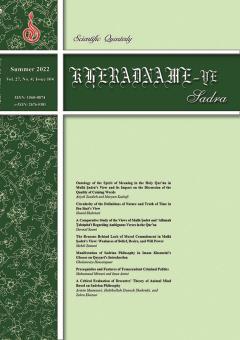-
-
List of Articles
-
Open Access Article
1 - Editor's Note
S. Mohammad Khamenei -
Open Access Article
2 - Ontology of the Spirit of Meaning in the Holy Qur’ān in Mullā Ṣadrā’s View and its Impact on the Discussion of the Quality of Coining Words
Maryam Kashefi Atiyeh Zandieh -
Open Access Article
3 - Circularity of the Definitions of Nature and Truth of Time in Ibn Sīnā’s View
Hamid Shahriari -
Open Access Article
4 - A Comparative Study of the Views of Mullā Ṣadrā and ‘Allāmah Ṭabāṭabā’ī Regarding Ambiguous Verses in the Qur’an
Davood Saemi -
Open Access Article
5 - The Reasons Behind Lack of Moral Commitment in Mullā Ṣadrā’s View:Weakness of Belief, Desire, and Will Power
Mehdi Zamani -
Open Access Article
6 - Manifestation of Sadrian Philosophy in Imam Khomeini’s Glosses on Qayṣarī’s Introduction
Gholamreza Hosseinpour -
Open Access Article
7 - Prerequisites and Features of Transcendent Criminal Politics
Mohammad Mirzaei Iman Amini -
Open Access Article
8 - A Critical Evaluation of Descartes’ Theory of Animal Mind Based on Sadrian Philosophy
Armin Mansouri Habibullah Danesh Shahraki zahra khazaie -
Open Access Article
9 - حكمت، حكومت، ولايت (گزارشي از بيست و ششمين همايش بزرگداشت حكيم صدرالمتألهين)
S. Mohammad Khamenei
-
The rights to this website are owned by the Raimag Press Management System.
Copyright © 2017-2026







